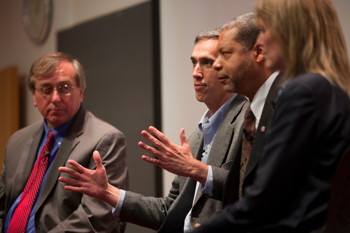COVER STORY
(page 2 of 2)Real work on CornellNYC Tech campus now begins

Rendering of part of the proposed tech campus on Roosevelt Island, which includes an amphitheater and a view of Manhattan. Photo illustration by Cornell. See larger image
Cornell leaders of the tech campus initiative detailed immediate next steps during an open forum on the Ithaca campus in February. Fuchs shared a partial to-do list: acquiring academic accreditation, hiring a principal designer and architect for the site, structuring the entrepreneurship-oriented curricula, hiring faculty and recruiting students – all while maintaining Cornell's Ithaca campus and entering into key phases of the "Cornell Now" fundraising campaign.
Students will learn and companies will grow in an environment that breaks with the tradition of departments and schools. The campus will instead be organized around interdisciplinary hubs directed toward sectors of the city's economy, currently planned as Healthier Life, Built Environment and Connective Media. These hubs are designed to change and grow with industry trends.
The year 2012 will bring work on environmental reviews of the Roosevelt Island site and master planning even as inaugural instruction begins in off-site locations in the city this fall.
The plan for the campus includes a 150,000-square-foot, "net-zero" core academic building. If built today, it would be the largest net-zero energy building in the eastern United States and among the top four largest such buildings in the entire United States.

Provost Kent Fuchs; Dan Huttenlocher, founding dean of the CornellNYC Tech campus; Lance Collins, dean of the College of Engineering; and Cathy Dove, vice president of the tech campus, during a February open forum at Cornell. See larger image
The new campus, Fuchs said, is intended to be financially self-sufficient. A $350 million gift from Atlantic Philanthropies, announced in the days leading up to Cornell's winning bid, will help the university immediately start recruiting and hiring new faculty to populate the campus. Atlantic Philanthropies' founding chairman, Chuck Feeney '56, has been among Cornell's most generous benefactors over the years, and his gift – the largest in the university's history – was key to securing Cornell's bid for the campus.
None of the Ithaca campus's operating budget is expected to be diverted to the new campus, Fuchs said.
Fuchs went on to predict that having the tech campus in New York City will create a symbiotic flow of people and ideas that will end up attracting people – and philanthropy – to Cornell in Ithaca, not just New York City.
The Cornell-Technion proposal, Bloomberg said in December, was the boldest and most ambitious of all those submitted. He talked about the dynamic partnership between Cornell and Technion, and he praised Cornell's established presence in New York City with Weill Cornell Medical College, its many academic and extension programs, and its active alumni base.
The campus, he continued, is expected to generate $23 billion in economic activity over the next three decades, as well as $1.4 billion in tax revenue. Building it will create an estimated 20,000 construction jobs and 8,000 permanent jobs to operate it.
Visit http://now.cornell.edu/nyctech
<<View entire story as one page>>